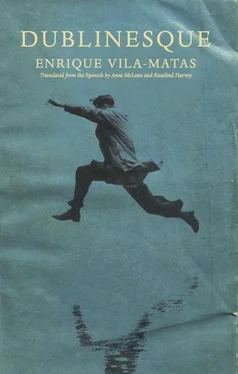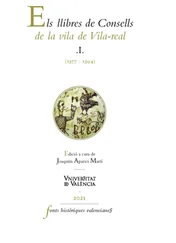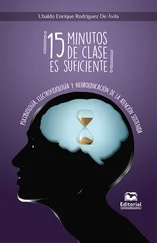“You, sir, are the essence of vulgarity,” he remembered a rejected author had once told him in his own office. Why had this phrase remained so deeply ingrained in his mind and why did it reappear at the trickiest moments, when he needed more self-confidence than usual?
He timidly asked for a gin with water. Marcel, the bartender from Marseille, said something to him in French to show him he remembered him from when he’d been there with Celia on the patio. Then he served him the gin. Riba drank it down in one gulp. Two years’ thirst, he thought. And from then on he didn’t think anything clearly anymore. The alcohol went straight to his head. One goes away suddenly, he thought. And in a flash returns. With the intention of changing. Head hung. Head in hands. The head, headquarters of everything. Motionless in the full moon the last publisher.
It’s difficult to know — for Riba himself — what exactly it was he’d just thought. Eventually, you have to pay for two years of abstinence. Anyway, he understood more or less the way things were going. Motionless, in the full moon, the last publisher. Wasn’t he the last publisher? He had been spending his nights in the rocking chair facing the moon, with the Gutenberg galaxy buried, and believing that all the stars were deceased souls, old relatives, acquaintances, charlatans. But no, this wasn’t the right interpretation. It was just the ruthless effects of alcohol. A drinker’s thoughts. Head hung. Head in hands.
“Another gin,” said Riba.
Was he the last publisher? That would be ideal, but no. In the paper every day he saw photos of all those new, young independent publishers. Most of them looked to him like insufferable, uneducated beings. He never thought he’d be replaced by such idiots and it was hard for him to accept, a long and painful process. Four idiots had dreamed of replacing him and had finally achieved it. And he himself had ended up making way for them, had helped them prosper by speaking well of them. It served him right for having been such a bastard, for being far too gracious and generous with the falsely discreet young lions of publishing.
One of those new publishers, for example, spent all his time proclaiming that we’re living in a transitional period toward a new culture and, wishing to prosper without effort, made claims for quite obtuse prose writers he claimed had found a goldmine in the “new language of the digital revolution,” so useful for covering up their lack of imagination and talent. Another one tried to publish foreign authors with the same taste and style as poor Riba and in fact succeeded only in imitating what he’d already done much more competently. Another wanted to copy the most spectacular heads of the Spanish publishing world; he dreamt of being a media star and his authors were mere pawns of his glory. In any case, none of the three seemed shrewd enough to endure the thirty years he’d endured. He’d heard they were planning some sort of homage to him in September and that the digital revolutionary, the imitator, and the aspiring superstar were at the head of it. But Riba thought only of fleeing from them. Behind that move were hidden motives, very little genuine admiration.
He gulped down a second gin, which was followed by others. After a short time, he felt like he was Spider, or rather, an arrow in a cobwebbed cellar of steel-gray light. There were so few people in the place that there was no point in looking for Walter’s Catalan friend among the clientele. In any case, no one there could be suspected of having called him on the intercom. And it began to seem obvious that someone had managed to get him mixed up in a little mystery, which he might be able to clear up the next day, or maybe he never would. It was, in any case, futile to look for the solution to the enigma between the four walls of that place. And he had made a huge mistake by going out at night. His gaze fell again on the two men in Irish caps he’d seen on his way in and who were sitting quite close to him at the bar. He thought he heard them speaking French and timidly approached them. Just then, one of them said:
“ Souvent, j’ai supposé que tout . .”
He stopped as he saw Riba approach and the phrase hung half-finished in the air. He supposed that everything what? That phrase turned into another mystery, probably forever now.
When minutes later, Riba nobly tackled his fifth gin, he was totally absorbed in a long chat with the Frenchmen. For a while he talked about cocktails he’d drunk in days gone by in bars all around the world and of sapphire swimming pools and white-jacketed waiters who served cold gin at certain clubs in Key West. Until in the mirror over the bar he began to see multi-colored rows of bottles of alcoholic beverages, as if he were on a carousel. And suddenly, with the first whiskey — he’d decided to abandon the gin in a flash — he asked the two Frenchmen a question about the decor of Irish houses, and without really knowing how, ended up causing Samuel Beckett to appear in the conversation.
“I know someone who has his house lined with Beckett,” said Verdier.
“Lined?” said Riba, surprised.
Although he asked him to explain this, Verdier refused to do so point blank.
A little while after the third whiskey, Riba interrupted Verdier somewhat nervously, just when Verdier was at the most critical stage of his predictions for Saturday’s races. Verdier looked stunned, as if he could barely understand why he’d been interrupted in such a way. Taking advantage of the confusion, Riba asked — and it seemed like he was asking the entire neighborhood — if they’d ever seen a guy in Dublin who looked a lot like the writer Beckett when he was young.
That was when, almost in unison, Verdier and Fournier told him that they knew someone just like that. In Dublin that double of Beckett’s was relatively famous, said Fournier. And the conversation entered a more animated phase, and at one point, Verdier even had a lovely memory of Forty Foot, a Beckettian location found in Sandycove, right in front of the Martello tower, which in fact appears in Ulysses . It’s the spot with steps carved into the breakwater from which, since time immemorial, Dubliners enjoy diving in all the seasons of the year. That’s where Beckett’s father taught his sons, Sam and Frank, to swim, by throwing them in, with tough cruelty. Both stayed afloat and became fiercely fond of swimming. In fact, whenever he returned to Ireland, Beckett always went to Forty Foot, although the place he swam in more frequently, his favorite spot among all those of his native land, was a marvellous inlet under the hill of Howth.
“A truly Beckettian place. Windy, radical, drastic, deserted,” said Verdier.
“Abode of gulls and coarse sailors, an end of the world scenario,” added Fournier.
When they were at their most animated, Celia entered the pub like a gale-force wind, shouting at Riba with a thunderous rage that seemed endless. For a while, Celia seemed like a bottomless pit of insults and wailing.
“This is the end,” she said when she managed to calm down a little, “you’ve committed the mistake of your life. The mistake of your life, you stupid man.”
While Verdier and Fournier instinctively withdrew to the part of the pub farthest away from the bar, Riba suddenly discovered it was again possible for him to experience an intense moment at the center of the world: a moment that, in spite of having already been foreseen in the prophetic dream, arrived now with the same volcanic force and energy he had already felt in the apocalyptic vision that, at the time, served as a warning that one day in Dublin he might find himself on the edge of a strange happiness.
It wasn’t exactly the ideal scenario; Celia wouldn’t stop shouting and the situation was embarrassing. But he guessed, allowing himself to be guided by the model of the dream he’d had two years before in the hospital, that Celia would soon become more affectionate. And what he guessed turned out to be true. When she tired of shouting, she hugged him. And they went on to experience a moment at the center of the world. There was a reason that moving embrace was in the premonitory Dublin dream. They hugged each other so hard that, as they left the pub, they staggered and lost their balance, and just as the dream had predicted, they fell to the ground, where they remained in each other’s arms, as if they were a single body. It was an embrace at the center of the world. A horrible hug, but also spectacular, emotional, serious, sad, and ridiculous. It was an essential embrace, right out of — never truer — a dream. The two of them sat there afterward on the curb on the south side of that north Dublin street. Tears for a disconsolate situation.
Читать дальше












